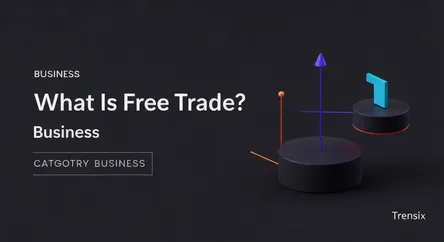Business
What Is Free Trade?

Explore free trade, the economic policy of unrestricted imports and exports. Learn why it's debated and how it affects global economies and you.
What is it?
Free trade is an economic policy where governments do not restrict imports from, or exports to, other countries. It's the opposite of protectionism. In a free trade system, goods and services cross international borders with little to no government-imposed barriers like tariffs (taxes on imports), quotas (limits on quantity), or subsidies. The goal is to create a more efficient global market, allowing countries to specialize in producing goods where they have a comparative advantage. Major examples of this policy in action are trade blocs and agreements like the United States-Mexico-Canada Agreement (USMCA) and the European Union Single Market.
Why is it trending?
Free trade is constantly trending due to the ongoing global debate between globalization and economic nationalism. Recent supply chain disruptions, geopolitical tensions, and trade disputes between major economies like the U.S. and China have brought the policy's pros and cons into sharp focus. Governments worldwide are continually negotiating, re-evaluating, or withdrawing from trade agreements, making it a persistent topic in political and economic news. Discussions about its impact on domestic jobs, national security, and environmental standards keep the concept relevant and highly debated.
How does it affect people?
For consumers, free trade can lead to lower prices and a wider variety of goods, as competition from international producers increases. However, it can negatively impact workers in domestic industries that struggle to compete with cheaper foreign labor, potentially leading to job losses in sectors like manufacturing. Conversely, it can create jobs in export-driven industries. Ultimately, free trade policies directly influence the cost of everyday goods, the availability of jobs in certain regions, and the overall economic health of a nation, making it a critical issue for almost everyone.